Last updated on January 26, 2025
Maintaining an active lifestyle on a gluten-free diet can be challenging, but it’s entirely possible to fuel your workouts without relying on wheat-based products. Whether you’re avoiding gluten due to celiac disease, gluten sensitivity, or by choice, proper nutrition is key to optimizing your energy, strength, and recovery. In this guide, we’ll explore how to stay gluten-free and fit, offering practical tips on choosing the right foods to fuel your workouts and support your fitness goals.
Table of Contents
Why Proper Fueling Matters on a Gluten-Free Diet
When you eliminate gluten from your diet, you also cut out many traditional carbohydrate sources like bread, pasta, and grains that are key energy providers for exercise. If you’re not careful, this could lead to reduced energy, nutrient deficiencies, and poor performance. To ensure you’re properly fueling your workouts and recovery, it’s essential to find gluten-free alternatives that supply carbohydrates, protein, healthy fats, and essential vitamins and minerals.
Key Nutrients for Gluten Free Workout Fuel
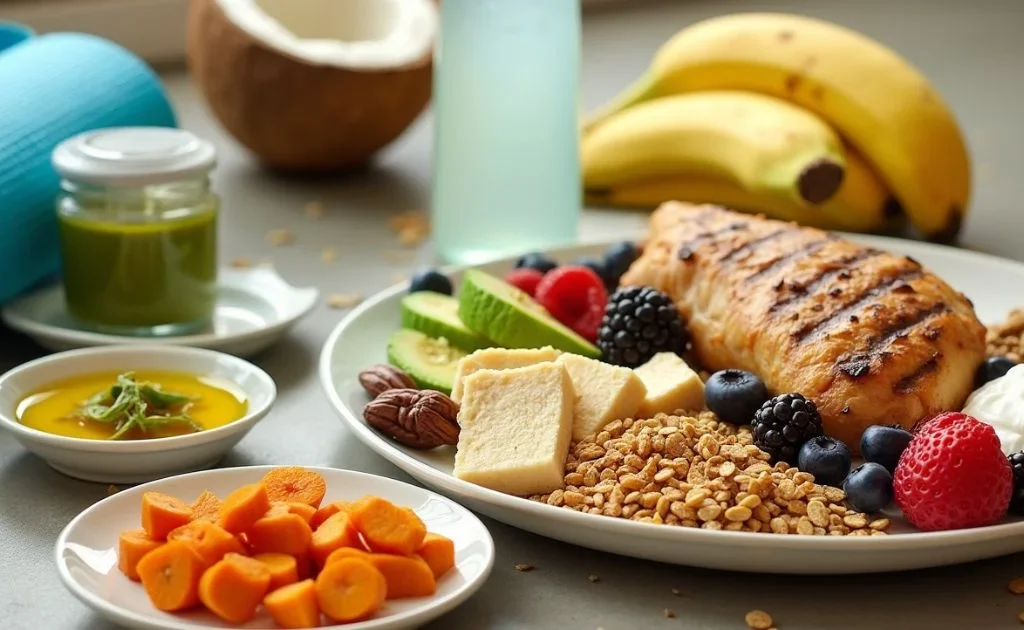
1. Carbohydrates for Energy
- Why Carbs Matter: Carbohydrates are your body’s primary source of fuel, especially during high-intensity exercise. They break down into glucose, which powers your muscles.
- Gluten-Free Sources: Sweet potatoes, quinoa, gluten-free oats, rice, bananas, berries, gluten-free pasta.
- Tip: Aim to consume complex carbohydrates before a workout to give you sustained energy. Post-workout, opt for faster-digesting carbs like fruit to replenish glycogen stores.
2. Protein for Muscle Repair
- Why Protein Matters: After exercise, especially strength training, your muscles need protein to repair and grow. Protein is also essential for immune function and overall recovery.
- Gluten-Free Sources: Chicken, turkey, fish, eggs, tofu, beans, lentils, Greek yogurt, nuts, seeds, protein powders (make sure they’re gluten-free).
- Tip: Include a source of protein in every meal and snack, especially post-workout, to support muscle repair.
3. Healthy Fats for Sustained Energy
- Why Fats Matter: Healthy fats help with longer-lasting energy, especially during endurance workouts, and support hormone regulation.
- Gluten-Free Sources: Avocado, olive oil, nuts, seeds, fatty fish like salmon, coconut oil.
- Tip: Incorporate healthy fats in your pre-workout meal to provide sustained energy for longer activities like running, cycling, or hiking.
4. Hydration for Performance
- Why Hydration Matters: Staying hydrated is essential for optimal performance and recovery. Dehydration can lead to muscle cramps, fatigue, and slower recovery times.
- Gluten-Free Hydration: Water, coconut water, gluten-free sports drinks, herbal teas.
- Tip: Drink water throughout the day, not just during exercise. Consider coconut water or a gluten-free electrolyte drink if you’re doing a long, intense workout.
Pre-Workout Gluten-Free Meal Ideas
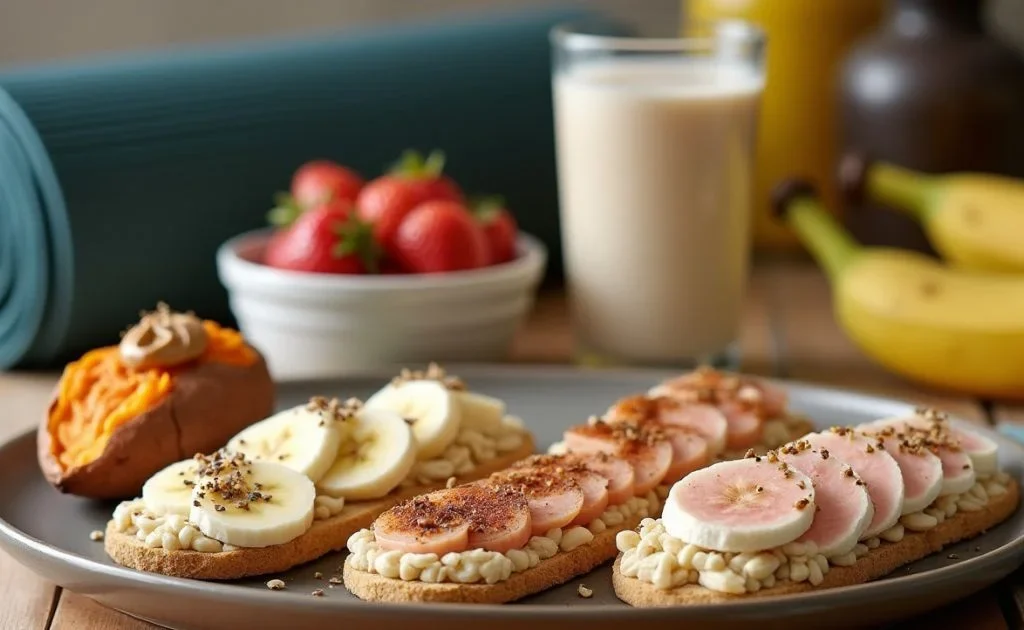
Your pre-workout meal should focus on easily digestible carbohydrates and a moderate amount of protein and fat to provide energy without weighing you down. Aim to eat 1-3 hours before your workout.
1. Sweet Potato with Almond Butter
- Sweet potatoes are a rich source of complex carbohydrates that provide steady energy. A dollop of almond butter adds protein and healthy fats.
2. Banana with Gluten-Free Oats and Chia Seeds
- This combination offers a great balance of fast-digesting carbohydrates, fiber, and omega-3s from chia seeds to fuel your workout.
3. Rice Cakes with Hummus and Turkey Slices
- A light, gluten-free snack that provides carbs, protein, and a bit of healthy fat without feeling too heavy.
4. Gluten-Free Smoothie
- Blend together a banana, gluten-free oats, almond milk, and a scoop of gluten-free protein powder for a quick and effective pre-workout drink.
Post-Workout Gluten-Free Recovery Meals
After exercising, your body requires a mix of protein and carbohydrates to restore glycogen levels and support muscle recovery. Aim to eat within 30 minutes to an hour after exercising.
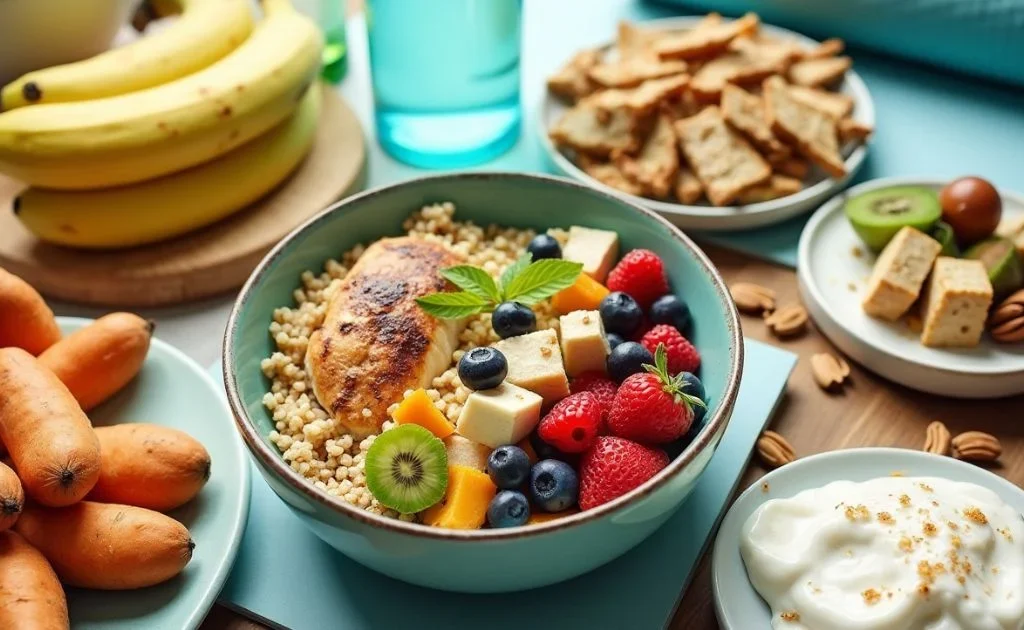
1. Quinoa and Grilled Chicken Bowl
- Quinoa is a complete protein and great gluten-free carbohydrate source. Paired with lean chicken and some vegetables, it makes a perfect post-workout meal.
2. Greek Yogurt with Gluten-Free Granola and Berries
- Greek yogurt offers a high amount of protein while berries and gluten-free granola provide necessary carbs for recovery.
3. Rice and Black Bean Stir-Fry
- A simple, gluten-free dish that provides protein, fiber, and carbohydrates in one filling meal. Add avocado for healthy fats.
4. Protein Smoothie with Almond Milk
- Use gluten-free protein powder, almond milk, a banana, and a tablespoon of peanut butter for a quick post-workout recovery shake.
Gluten-Free Snack Ideas for Active Lifestyles
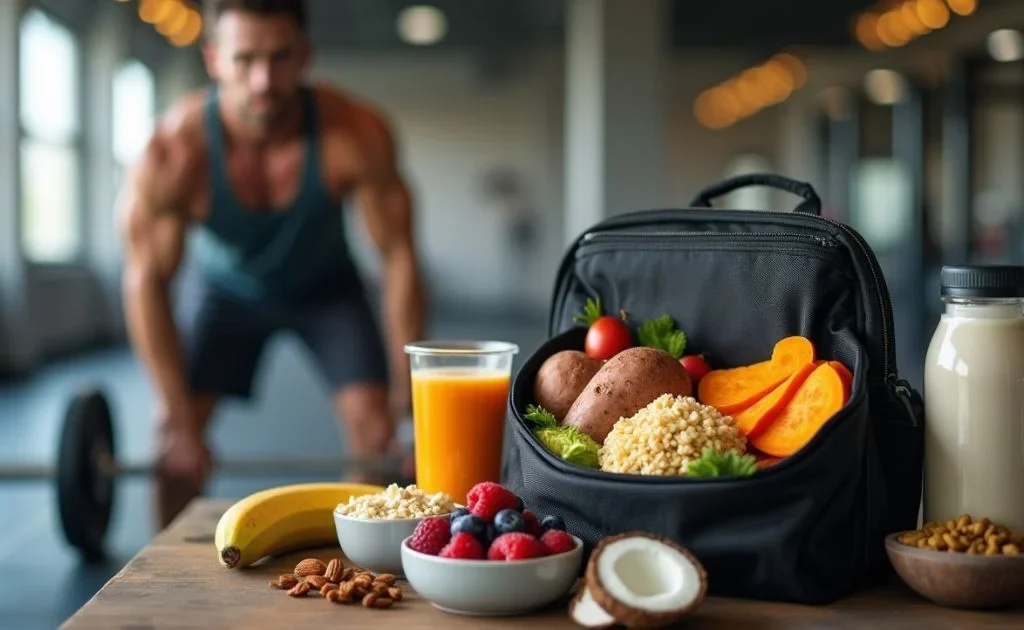
Keeping gluten-free, high-energy snacks on hand is important for anyone leading an active lifestyle. Here are a few quick and portable snack ideas that will keep you fueled during the day:
- Nuts and Seeds: Almonds, cashews, and pumpkin seeds provide healthy fats, protein, and fiber.
- Gluten-Free Energy Bars: Look for gluten-free certified energy bars made with oats, nuts, and seeds.
- Rice Cakes with Peanut Butter: A light, gluten-free snack packed with energy.
- Fruit and Nut Mix: Combine dried fruits (like raisins or apricots) with nuts for a quick source of carbohydrates and fats.
Supplementing on a Gluten-Free Diet
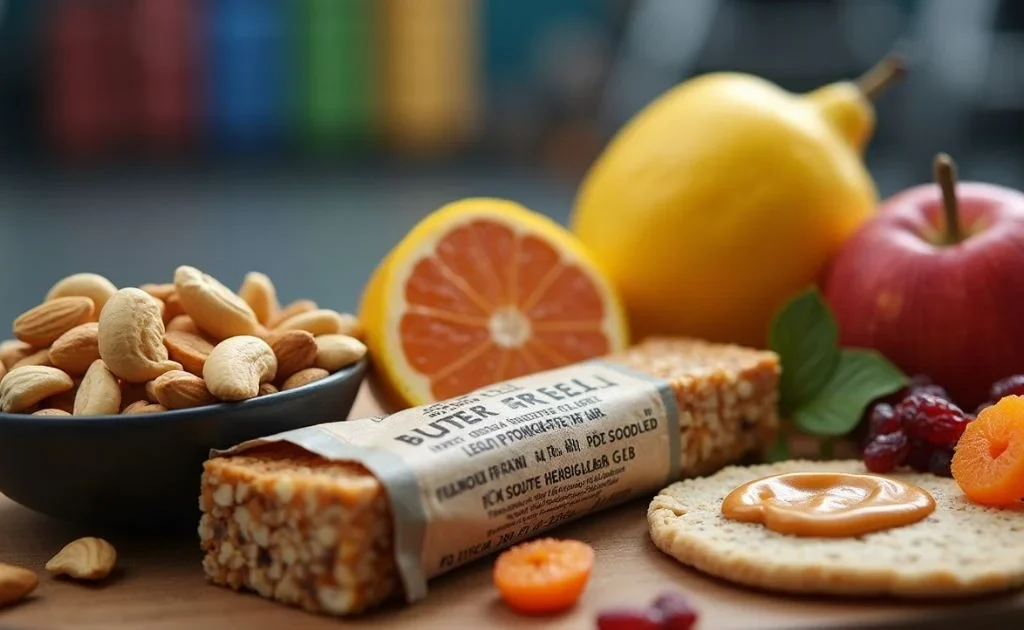
For some athletes, supplementing may be necessary to ensure optimal performance. However, many supplements contain gluten, so always check labels and look for gluten-free certifications.
1. Gluten-Free Protein Powder:
- Ensure your protein powder is gluten-free, especially if it’s a whey or plant-based option. Many brands offer gluten-free protein powders derived from peas, hemp, or brown rice.
2. BCAAs (Branched-Chain Amino Acids):
- These can help reduce muscle soreness and improve recovery, especially after strength workouts. Be sure to find a gluten-free brand.
3. Electrolyte Drinks:
- Hydration is key for performance, especially during longer workouts. Gluten-free electrolyte drinks can help replace lost minerals.
Conclusion
Staying gluten-free while maintaining an active and fit lifestyle is entirely possible with the right approach. By focusing on whole foods, balanced macronutrients, and gluten-free alternatives, you can fuel your workouts and support recovery without compromising your health or performance. Whether you’re training for a race, hitting the gym, or just leading an active lifestyle, these tips will help you stay energized, fit, and gluten-free.
Frequently Asked Questions (FAQ)
Can I still perform well in endurance sports on a gluten-free diet?
Yes, by focusing on complex carbohydrates like sweet potatoes, quinoa, and gluten-free oats, you can ensure steady energy for endurance activities. Make sure to consume enough calories to support your activity level.
What’s the best gluten-free snack to eat during a workout?
Snacks like gluten-free energy bars, bananas, or a handful of nuts can provide quick energy without upsetting your stomach.
How do I make sure I’m getting enough nutrients on a gluten-free diet?
A varied diet that includes whole gluten-free grains, lean proteins, healthy fats, and plenty of fruits and vegetables should cover your nutritional needs. You can also consult a nutritionist to ensure your diet is balanced.
Can I use protein powder if I’m gluten-free?
Yes, many protein powders are gluten-free. Look for labels that certify the product as gluten-free to avoid cross-contamination.
Is it harder to build muscle on a gluten-free diet?
No, building muscle is all about proper nutrition and exercise, regardless of whether you eat gluten. Focus on getting enough protein and calories, and incorporate strength training into your routine.




